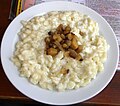Traditional food
Overview of traditional food and its cultural significance
Introduction[edit]
Traditional food refers to the culinary practices and dishes that are passed down through generations within a particular culture or region. These foods are often prepared using time-honored methods and ingredients that are native to the area. Traditional foods are an integral part of cultural heritage and identity, reflecting the history, environment, and values of a community.
Characteristics of Traditional Food[edit]
Traditional foods are characterized by their use of local ingredients and traditional cooking methods. They often involve recipes that have been preserved over time, sometimes with little alteration. These foods are typically prepared using techniques such as fermentation, drying, smoking, and pickling, which were historically used to preserve food before the advent of modern refrigeration.
Ingredients[edit]
The ingredients used in traditional foods are usually sourced locally and are often seasonal. This reliance on local produce means that traditional dishes can vary significantly from one region to another, even within the same country. For example, Mediterranean cuisine is known for its use of olive oil, fresh vegetables, and seafood, while Scandinavian cuisine often features fish, potatoes, and rye bread.
Cooking Methods[edit]
Traditional cooking methods are often labor-intensive and require a deep understanding of the ingredients and techniques. Common methods include:
- Fermentation: Used to make foods like sauerkraut, kimchi, and yogurt.
- Smoking: A method used to preserve and flavor meats and fish.
- Drying: Used for preserving fruits, vegetables, and meats.
- Pickling: A method of preserving food in vinegar or brine.
Cultural Significance[edit]
Traditional foods play a crucial role in cultural identity and heritage. They are often associated with festivals, celebrations, and rituals, serving as a means of bringing people together. For instance, Thanksgiving in the United States is synonymous with turkey, while Lunar New Year celebrations in China feature dishes like dumplings and fish.
Preservation of Tradition[edit]
The preservation of traditional food practices is important for maintaining cultural diversity and heritage. Many communities are actively working to document and revive traditional recipes and cooking methods, often in response to the globalization of food and the rise of fast food culture.
Health Aspects[edit]
Traditional foods are often considered healthier than modern processed foods, as they are typically made from whole, unprocessed ingredients. They can provide a balanced diet rich in nutrients, although this can vary depending on the specific cuisine and dietary practices of a region.
Challenges and Modern Adaptations[edit]
While traditional foods are valued for their cultural significance, they face challenges in the modern world. Urbanization, globalization, and changing lifestyles have led to a decline in traditional food practices. However, there is a growing movement to adapt traditional foods to modern tastes and dietary needs, ensuring their survival for future generations.
Related Pages[edit]
-
Haluskyzo Ziaru
-
Bambara nut unearthed
-
Humas
-
La Banquise Poutine
-
Spring Pancake
-
Stora Dimun Puffins for Kitchen
-
Karjalanpiirakka
-
Fiambre
-
Tumpeng Jawa
-
Pizza Lafayette at Guido's Pizza
-
Outlet mall of KIKYOUYA
-
Bibimbap at restaurant Korean Kitchen
-
Grey peas at restaurant Milda in Riga
Ad. Transform your life with W8MD's Budget GLP-1 injections from $75


W8MD offers a medical weight loss program to lose weight in Philadelphia. Our physician-supervised medical weight loss provides:
- Weight loss injections in NYC (generic and brand names):
- Zepbound / Mounjaro, Wegovy / Ozempic, Saxenda
- Most insurances accepted or discounted self-pay rates. We will obtain insurance prior authorizations if needed.
- Generic GLP1 weight loss injections from $75 for the starting dose.
- Also offer prescription weight loss medications including Phentermine, Qsymia, Diethylpropion, Contrave etc.
NYC weight loss doctor appointmentsNYC weight loss doctor appointments
Start your NYC weight loss journey today at our NYC medical weight loss and Philadelphia medical weight loss clinics.
- Call 718-946-5500 to lose weight in NYC or for medical weight loss in Philadelphia 215-676-2334.
- Tags:NYC medical weight loss, Philadelphia lose weight Zepbound NYC, Budget GLP1 weight loss injections, Wegovy Philadelphia, Wegovy NYC, Philadelphia medical weight loss, Brookly weight loss and Wegovy NYC
|
WikiMD's Wellness Encyclopedia |
| Let Food Be Thy Medicine Medicine Thy Food - Hippocrates |
Medical Disclaimer: WikiMD is not a substitute for professional medical advice. The information on WikiMD is provided as an information resource only, may be incorrect, outdated or misleading, and is not to be used or relied on for any diagnostic or treatment purposes. Please consult your health care provider before making any healthcare decisions or for guidance about a specific medical condition. WikiMD expressly disclaims responsibility, and shall have no liability, for any damages, loss, injury, or liability whatsoever suffered as a result of your reliance on the information contained in this site. By visiting this site you agree to the foregoing terms and conditions, which may from time to time be changed or supplemented by WikiMD. If you do not agree to the foregoing terms and conditions, you should not enter or use this site. See full disclaimer.
Credits:Most images are courtesy of Wikimedia commons, and templates, categories Wikipedia, licensed under CC BY SA or similar.
Translate this page: - East Asian
中文,
日本,
한국어,
South Asian
हिन्दी,
தமிழ்,
తెలుగు,
Urdu,
ಕನ್ನಡ,
Southeast Asian
Indonesian,
Vietnamese,
Thai,
မြန်မာဘာသာ,
বাংলা
European
español,
Deutsch,
français,
Greek,
português do Brasil,
polski,
română,
русский,
Nederlands,
norsk,
svenska,
suomi,
Italian
Middle Eastern & African
عربى,
Turkish,
Persian,
Hebrew,
Afrikaans,
isiZulu,
Kiswahili,
Other
Bulgarian,
Hungarian,
Czech,
Swedish,
മലയാളം,
मराठी,
ਪੰਜਾਬੀ,
ગુજરાતી,
Portuguese,
Ukrainian












